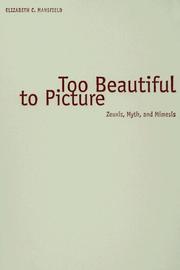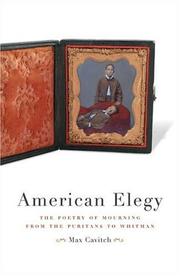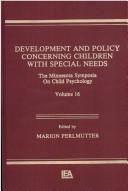| Listing 1 - 10 of 198 | << page >> |
Sort by
|
Book
Year: 1960 Publisher: [Minneapolis?] : [s.n.],
Abstract | Keywords | Export | Availability | Bookmark
 Loading...
Loading...Choose an application
- Reference Manager
- EndNote
- RefWorks (Direct export to RefWorks)
Book
Year: 1945 Publisher: : [Minneapolis],
Abstract | Keywords | Export | Availability | Bookmark
 Loading...
Loading...Choose an application
- Reference Manager
- EndNote
- RefWorks (Direct export to RefWorks)
Industrial relations --- Relations industrielles --- Congresses --- Congrès
Book
Year: 1921 Publisher: Minneapolis : University of Minnesota,
Abstract | Keywords | Export | Availability | Bookmark
 Loading...
Loading...Choose an application
- Reference Manager
- EndNote
- RefWorks (Direct export to RefWorks)
Universities and colleges --- Universités --- Coffman, Lotus Delta,
Book
Year: 2015 Publisher: [Place of publication not identified] University of Minnesota Libraries Publishing
Abstract | Keywords | Export | Availability | Bookmark
 Loading...
Loading...Choose an application
- Reference Manager
- EndNote
- RefWorks (Direct export to RefWorks)
Business Communication for Success (BCS) provides a comprehensive, integrated approach to the study and application of written and oral business communication to serve both student and professor. This series features chapters with the following elements: Learning Objectives Introductory Exercises Clear expectations, relevant background, and important theories Practical, real-world examples Key Takeaways or quick internal summaries Key terms that are easily identified In-chapter assignments Postchapter assessments linked to objectives and skills acquisition Each chapter is self-contained, allowing for mix-and-match flexibility and custom or course-specific design. Each chapter focuses on clear objectives and skill demonstrations that can be easily linked to your syllabus and state or federal requirements. Supported by internal and external assessments, each chapter features time-saving and learning-enhancement support for instructors and students. BCS is designed to help students identify important information, reinforce for retention, and demonstrate mastery with a clear outcome product. The text has three content categories: Foundations Process and products Contexts The first three chapters form the core foundation for the study of oral and written business communication. The next sequence of chapters focus on the process of writing, then oral performance with an emphasis on results. The final sequence focuses on contexts where business communication occurs, from interpersonal to intercultural, from groups to leadership. In each of the process and product chapter sequences, the chapters follow a natural flow, from prewriting to revision, from preparation for a presentation to performance. Each sequence comes together in a concluding chapter that focuses on action—where we apply the skills and techniques of written or oral communication in business, from writing a letter to presenting a sales speech. These performances not only serve to reinforce real-world applications but also may serve as course assessments. This text has been used in classes at: Ohio University, Miami University – Oxford, Kent State University – Salem Campus, Cuyahoga Community College – West, University of Toledo, Cuyahoga Community College – District, Northern Arizona University, Gateway Community College, University of Arizona, Arizona Western College, Boise State University,Western Governors University, Doane College, Mcpherson College, University of Nebraska Med Center, Suny Fredonia, State University of New York Institute of Technology at Utica/Rome, Trinidad State Junior College, University of Delaware, Brenau University, Brewton-Parker College, Loras College, Kapiolani Community College, Muscatine Community College, Greenville College, University of Illinois – Chicago, Millikin University, Rockland Community College, Cornell University, National-Louis University – Lisle, St. Gregory's University, University of Southern Indiana, Missouri State University – W Plains, Bucks County Community College – Newton, Clarion University of Pennsylvania, Pulaski Technical College, Temple University, Dixie State College of Utah, Averett University, Virginia Polytech Institute, Fond Du Lac Tribal Community College, Lipscomb University, Edgewood College, University of Wisconsin – Stout, Wisconsin Lutheran College, Virginia State University, North Georgia Technical College – Blairsville, Paradise Valley Community College, Fordham University – Lincoln Center, New England College of Business/Finance, Eastern New Mexico University, University of Alabama, Albertus Magnus College, Pepperdine University, Fullerton College, Santa Ana College, Miracosta College – Oceanside, San Jose State University, De Anza College, University of The Southwest, Florida Institute of Technology, Forida State University, Dean College, California State University, University of Massachusetts, Suffolk University, Stevenson University, Worcester State College, University of Maryland, Clover Park Technical College, Minnesota State University – Moorhead, College of St. Scholastica, Ferris State University, Concordia University, Southern New Hampshire University, Lower Columbia College, University of North Carolina – Greensboro, Rockingham Community College, Stanly Community College, Wayland Baptist University, Bunker Hill Community College, Salve Regina University, University of The Incarnate Word, St. Mary's University, University of Rhode Island, Texarkana College, Renton Technical College, Tarleton State University, Wayland Baptist University – Plainview, University of Houston, Stephen F. Austin State University, Bates Technical College, Chabot College, Bakersfield College, Azusa Pacific University, University of Houston – Downtown, California Southern University, Miracosta College, American Public University, American Public University System, Huntington Junior College, Flat World Knowledge University, Jackson Senior High School, Holmes High School, Dlielc, Clintondale High School, American University in Kosovo in Conjunction with Rochester Institute of Technology, Southeast Lauderdale High School, Benedict Business Hotel Management School, University of the People, Kwame Nkrumah University of Science and Technology, New Brunswick College of Craft and Design, New England School of English, Comsats Institute of Information Technology, Wayland Baptist University – Anchorage, Volcano Vista High School, Wayland Baptist University – San Antonio, Morrill High School, North Island College – B Campus, Seneca College, APOU, University of North Carolina – Greensboro, Southern New Hampshire University, University of Maryland University College, Harrisburg High School
Book
Year: 2015 Publisher: [Place of publication not identified] University of Minnesota Libraries Publishing
Abstract | Keywords | Export | Availability | Bookmark
 Loading...
Loading...Choose an application
- Reference Manager
- EndNote
- RefWorks (Direct export to RefWorks)
Business Communication for Success (BCS) provides a comprehensive, integrated approach to the study and application of written and oral business communication to serve both student and professor. This series features chapters with the following elements: Learning Objectives Introductory Exercises Clear expectations, relevant background, and important theories Practical, real-world examples Key Takeaways or quick internal summaries Key terms that are easily identified In-chapter assignments Postchapter assessments linked to objectives and skills acquisition Each chapter is self-contained, allowing for mix-and-match flexibility and custom or course-specific design. Each chapter focuses on clear objectives and skill demonstrations that can be easily linked to your syllabus and state or federal requirements. Supported by internal and external assessments, each chapter features time-saving and learning-enhancement support for instructors and students. BCS is designed to help students identify important information, reinforce for retention, and demonstrate mastery with a clear outcome product. The text has three content categories: Foundations Process and products Contexts The first three chapters form the core foundation for the study of oral and written business communication. The next sequence of chapters focus on the process of writing, then oral performance with an emphasis on results. The final sequence focuses on contexts where business communication occurs, from interpersonal to intercultural, from groups to leadership. In each of the process and product chapter sequences, the chapters follow a natural flow, from prewriting to revision, from preparation for a presentation to performance. Each sequence comes together in a concluding chapter that focuses on action—where we apply the skills and techniques of written or oral communication in business, from writing a letter to presenting a sales speech. These performances not only serve to reinforce real-world applications but also may serve as course assessments. This text has been used in classes at: Ohio University, Miami University – Oxford, Kent State University – Salem Campus, Cuyahoga Community College – West, University of Toledo, Cuyahoga Community College – District, Northern Arizona University, Gateway Community College, University of Arizona, Arizona Western College, Boise State University,Western Governors University, Doane College, Mcpherson College, University of Nebraska Med Center, Suny Fredonia, State University of New York Institute of Technology at Utica/Rome, Trinidad State Junior College, University of Delaware, Brenau University, Brewton-Parker College, Loras College, Kapiolani Community College, Muscatine Community College, Greenville College, University of Illinois – Chicago, Millikin University, Rockland Community College, Cornell University, National-Louis University – Lisle, St. Gregory's University, University of Southern Indiana, Missouri State University – W Plains, Bucks County Community College – Newton, Clarion University of Pennsylvania, Pulaski Technical College, Temple University, Dixie State College of Utah, Averett University, Virginia Polytech Institute, Fond Du Lac Tribal Community College, Lipscomb University, Edgewood College, University of Wisconsin – Stout, Wisconsin Lutheran College, Virginia State University, North Georgia Technical College – Blairsville, Paradise Valley Community College, Fordham University – Lincoln Center, New England College of Business/Finance, Eastern New Mexico University, University of Alabama, Albertus Magnus College, Pepperdine University, Fullerton College, Santa Ana College, Miracosta College – Oceanside, San Jose State University, De Anza College, University of The Southwest, Florida Institute of Technology, Forida State University, Dean College, California State University, University of Massachusetts, Suffolk University, Stevenson University, Worcester State College, University of Maryland, Clover Park Technical College, Minnesota State University – Moorhead, College of St. Scholastica, Ferris State University, Concordia University, Southern New Hampshire University, Lower Columbia College, University of North Carolina – Greensboro, Rockingham Community College, Stanly Community College, Wayland Baptist University, Bunker Hill Community College, Salve Regina University, University of The Incarnate Word, St. Mary's University, University of Rhode Island, Texarkana College, Renton Technical College, Tarleton State University, Wayland Baptist University – Plainview, University of Houston, Stephen F. Austin State University, Bates Technical College, Chabot College, Bakersfield College, Azusa Pacific University, University of Houston – Downtown, California Southern University, Miracosta College, American Public University, American Public University System, Huntington Junior College, Flat World Knowledge University, Jackson Senior High School, Holmes High School, Dlielc, Clintondale High School, American University in Kosovo in Conjunction with Rochester Institute of Technology, Southeast Lauderdale High School, Benedict Business Hotel Management School, University of the People, Kwame Nkrumah University of Science and Technology, New Brunswick College of Craft and Design, New England School of English, Comsats Institute of Information Technology, Wayland Baptist University – Anchorage, Volcano Vista High School, Wayland Baptist University – San Antonio, Morrill High School, North Island College – B Campus, Seneca College, APOU, University of North Carolina – Greensboro, Southern New Hampshire University, University of Maryland University College, Harrisburg High School

ISBN: 9780816647491 9780816647484 0816647488 0816647496 Year: 2007 Publisher: Minneapolis University of Minnesota Press
Abstract | Keywords | Export | Availability | Bookmark
 Loading...
Loading...Choose an application
- Reference Manager
- EndNote
- RefWorks (Direct export to RefWorks)
Few tales of artistic triumph can rival the story of Zeuxis. As first reported by Cicero and Pliny, the painter Zeuxis set out to portray Helen of Troy, but when he realized that a single model could not match Helen's beauty, he combined the best features of five different models. A primer on mimesis in art making, the Zeuxis myth also illustrates ambivalence about the ability to rely on nature as a model for ideal form. In Too Beautiful to Picture, Elizabeth C. Mansfield engages the visual arts, literature, and performance to examine the desire to make the ideal visible. She finds in the Zeuxis myth evidence of a cultural primal scene that manifests itself in gendered terms. Mansfield considers the many depictions of the legend during the Renaissance and questions its absence during the eighteenth century. Offering interpretations of Angelica Kauffman's paintings, Mary Shelley's Frankenstein, and Picasso's Les Demoiselles d'Avignon, Mansfield also considers Orlan's carnal art as a profound retelling of the myth. Throughout, Mansfield asserts that the Zeuxis legend encodes an unconscious record of the West's reliance on mimetic representation as a vehicle for metaphysical solace. Elizabeth C. Mansfield is associate professor of art history at the University of the South.
Comparative religion --- Art --- Zeuxis --- 82:7 --- Literatuur en kunst --- Art and mythology. --- Mimesis in art. --- Narrative art. --- Zeuxis, --- 82:7 Literatuur en kunst --- Art and mythology --- Mimesis in art --- Narrative art --- Art, Narrative --- Narrative art (Visual arts) --- Art genres --- Imitation in art --- Mythology and art --- Mythology in art --- Mythology --- Zeuxippos,

ISBN: 081664893X 9780816648931 9780816648924 0816648921 0816698856 Year: 2007 Publisher: Minneapolis London University of Minnesota Press
Abstract | Keywords | Export | Availability | Bookmark
 Loading...
Loading...Choose an application
- Reference Manager
- EndNote
- RefWorks (Direct export to RefWorks)
Bereavement in literature --- Chagrin dans la littérature --- Death in literature --- Deuil--Coutumes dans la littérature --- Dood in de literatuur --- Grief in literature --- Mort dans la littérature --- Mourning customs in literature --- Rouwgebruiken in de literatuur --- Sterfte in de literatuur --- Verdriet in de literatuur --- Elegiac poetry, American --- American poetry --- Mourning customs in literature. --- Grief in literature. --- Death in literature. --- History and criticism. --- American elegiac poetry --- History and criticism --- Elegiac poetry [American ] --- Emerson, Ralph Waldo --- Criticism and interpretation --- Whitman, Walt --- Wheatley, Phillis --- Lincoln, Abraham

ISBN: 0898592615 Year: 1983 Volume: 16 Publisher: Hillsdale, N.J. : L. Erlbaum Associates,
Abstract | Keywords | Export | Availability | Bookmark
 Loading...
Loading...Choose an application
- Reference Manager
- EndNote
- RefWorks (Direct export to RefWorks)
Child development --- Child development disorders --- Child psychology --- Children --- Parent and child --- Adaptability (Psychology) --- Child psychopathology --- Enfants --- Parents et enfants --- Congresses --- Government policy --- Prevention --- Développement --- Congrès --- Psychologie --- -Child development --- -Child psychology --- -Children --- -Parent and child --- -Child and parent --- Children and parents --- Parent-child relations --- Parents and children --- Children and adults --- Interpersonal relations --- Parental alienation syndrome --- Sandwich generation --- Childhood --- Kids (Children) --- Pedology (Child study) --- Youngsters --- Age groups --- Families --- Life cycle, Human --- Mental illness in children --- Psychopathology, Child --- Psychopathology in children --- Child mental health --- Psychology, Pathological --- Child psychiatry --- Child study --- Development, Child --- Developmental biology --- Developmental psychobiology --- Child rearing --- Adaptation (Psychology) --- Adaptive behavior --- Flexibility (Psychology) --- Malleability (Psychology) --- Personality --- Adjustment (Psychology) --- Congresses. --- -Congresses --- Mental disorders --- Development --- Developmental Disabilities --- Développement --- Congrès --- Child Development --- Prevention&delete& --- Government policy&delete&
Book
ISBN: 0898595460 9780898595468 Year: 1986 Volume: 18 Publisher: Hillsdale Erlbaum
Abstract | Keywords | Export | Availability | Bookmark
 Loading...
Loading...Choose an application
- Reference Manager
- EndNote
- RefWorks (Direct export to RefWorks)
Child psychology --- Child development --- Cognition --- Congresses --- Child Development. --- Cognition. --- -Child psychology --- -Psychology --- Child study --- Children --- Development, Child --- Developmental biology --- Developmental psychobiology --- Child rearing --- Cognitive Function --- Cognitions --- Cognitive Functions --- Function, Cognitive --- Functions, Cognitive --- Infant Development --- Development, Infant --- Psychology, Child --- Growth --- Congresses. --- Development --- Ontwikkelingspsychologie --- sociale en morele ontwikkeling --- -Congresses --- sociale en morele ontwikkeling. --- Sociale en morele ontwikkeling. --- Child Development --- Child psychology - Congresses --- Child development - Congresses --- Cognition - Congresses
Book
ISBN: 9780816669653 9780816669646 Year: 2011 Publisher: Minneapolis, Minn. London University of Minnesota Press
Abstract | Keywords | Export | Availability | Bookmark
 Loading...
Loading...Choose an application
- Reference Manager
- EndNote
- RefWorks (Direct export to RefWorks)
Cartography in literature. --- Space in literature. --- Cartography --- French poetry --- Geography in literature. --- Place (Philosophy) in literature. --- History --- History and criticism
| Listing 1 - 10 of 198 | << page >> |
Sort by
|

 Search
Search Feedback
Feedback About UniCat
About UniCat  Help
Help News
News